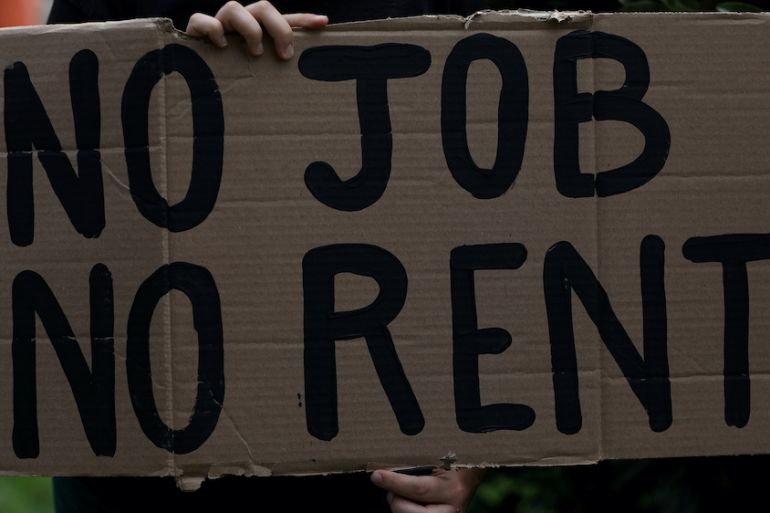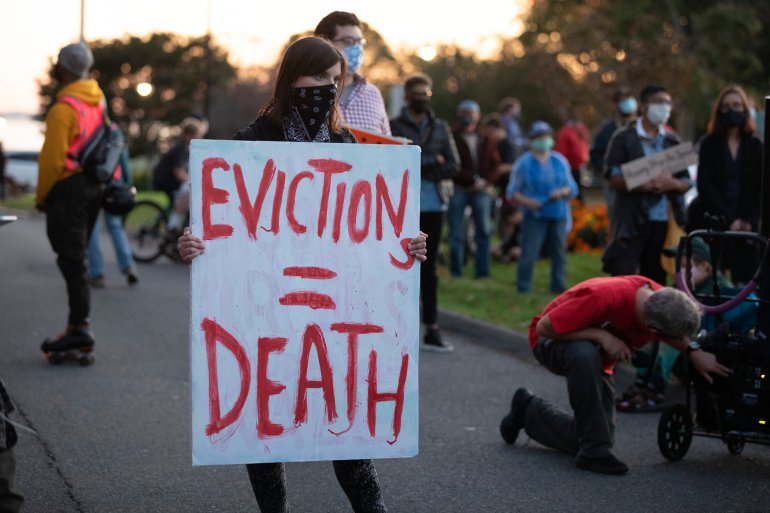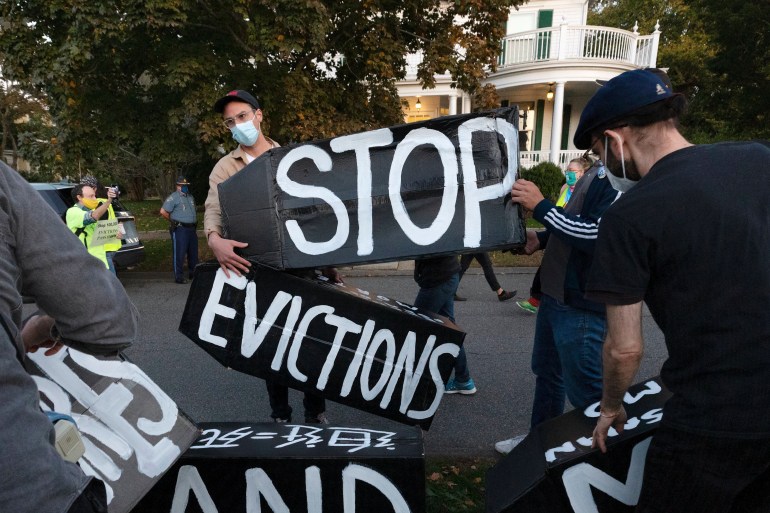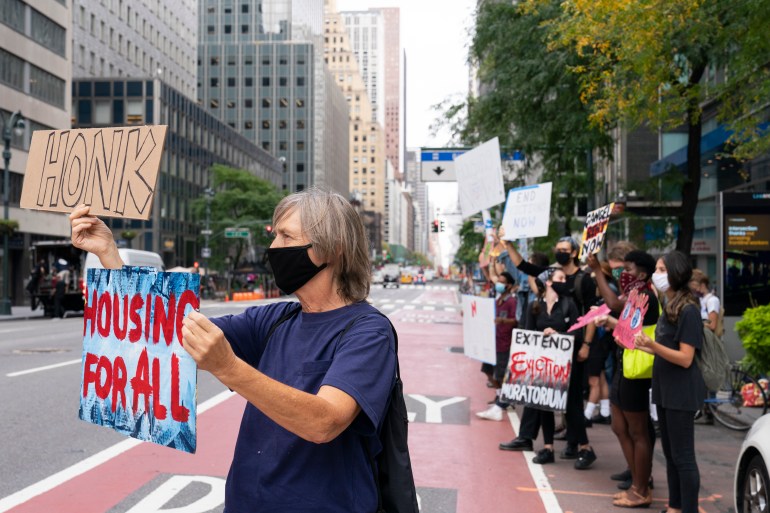Eviction looms for struggling US renters as stimulus talks drag
A federal moratorium on evictions is slated to end on December 31. Without additional relief, millions of Americans may face housing insecurity as COVID-19 rages.

Koz Ware was looking forward to 2020. After working at an accounting job throughout his 20s, he was finally earning enough to quit and devote himself full-time to his passion project of DJing events.
Ware and his wife had just welcomed their third child, and the couple felt financially comfortable enough to upgrade from their apartment to a house in Phoenix, Arizona in the United States.
Keep reading
list of 4 itemsBiden’s economic team takes shape and it is full of firsts
‘Scarlet E’: An eviction in the US can become a life sentence
US landlords sue over eviction ban as tenants struggle to pay
Then COVID-19 hit. In a matter of days, all of Ware’s upcoming gigs were cancelled with no plans in sight to reschedule. He tried getting his old job back. Though his old employer was sympathetic, they had to let staff go because of the pandemic, so rehiring him was off the table, he said.
Ware’s wife’s job did not pay enough for the family to make ends meet. As the weeks stretched into months, the couple juggled their bills, trying to prioritise the most essential.
“In July, we stopped paying for my wife’s car, and we missed August rent,” Ware said.
Ware says he tried to reach out to the rental management company and filled out Arizona’s required COVID-19 hardship forms. In the meantime, the family paid the rent to the best of their ability, but “we could never pay more than half of our $2,000 per month in rent”, he said.
As summer turned to fall, the couple also searched for more affordable housing and finally found a smaller apartment. But a week before they were set to move, Ware came home to an eviction notice on his door.

At risk for eviction
Despite state eviction moratoriums, as well as a national order from the Centers for Disease Control and Prevention temporarily halting residential evictions during the COVID-19 crisis, many renters are still at risk.
In the 27 cities tracked by Princeton University’s Eviction Lab, landlords had filed more than 151,000 evictions since the pandemic began.
Even families like Ware’s that file hardship forms are not exempt.
The CDC order allows landlords to challenge tenants’ COVID hardship declarations in court – something many have done, said James Ryan, the president of Time for Homes, a nonprofit based in Albany, New York.
“It’s pretty incredible how flagrantly some areas are flouting the [current] CDC guidance,” Ryan told Al Jazeera. “By and large, landlords know how to navigate the system with a much greater degree of savvy than tenants – especially ones facing economic hardships that certainly cannot afford to hire an attorney.”
That was true for the Wares. Their eviction notice required them to dial into a virtual court hearing. Ware said he explained to the judge that he had filed COVID hardship paperwork, but the judge told him that his paperwork had never been received. Ware lost the case.
He and his family managed to cobble together a place to stay for the week before their new apartment was ready. But the eviction will be a black mark on his financial history for many years to come.
“We are going to have an eviction on our credit [report], as well as repossession and credit cards that are maxed out,” he said.
Still, he considers himself lucky. “We didn’t become homeless,” Ware said.

A housing and public health crisis
Not everyone will be fortunate enough to escape homelessness, experts fear, because the US’s eviction crisis is about to get a lot worse.
The CDC’s eviction moratorium expires on December 31. Unless Congress passes a new virus relief aid bill before the year is out that continues to extend support to struggling tenants, experts fear millions could lose their homes or face precarious financial situations even as COVID-19 continues to surge throughout the country.
The scope of the problem is enormous. Some nine million US households were in arrears on rent payments as of November 9, according to the US Census Bureau’s Household Pulse Survey. That is roughly 18 percent of all renter-occupied units in the country.
And more than six million households had “no confidence” that they would be able to pay next month’s rent, the Pulse Survey found.
“There’s a popular saying that most people are only a paycheque or two away from the street. That’s never been more true than right now,” Ryan said.
When the moratorium expires, tenants will be on the hook for more than just the current month’s payment.
The CDC order does not waive missed payments or late fees – so when it expires, tenants are responsible for all of those back payments, something few can afford to pay when 10 million of the jobs lost at the beginning of the pandemic have yet to return.

There is also a potential public health impact if people are evicted and forced to live in crowded homeless shelters or on the streets. Modelling by researchers at the University of Pennsylvania projects that across scenarios “evictions lead to significant increase in infections”.
A new study by researchers at UCLA and Johns Hopkins University found that lifting eviction moratoriums has a real impact on cases and deaths. Their study, which is under peer review, compared states with eviction moratoriums in place between March and September to those that lifted them, finding that lifting moratoriums led to an estimated 433,700 additional COVID-19 cases and an estimated additional 10,700 deaths.
Without a federal moratorium, experts fear that a patchwork of local and state laws will not go far enough to stop the potential public health and economic damage.
“Ideally, the new administration will enact a nationwide eviction moratorium to ensure people can shelter safely in place,” Emily Benfer, a visiting professor of law at Wake Forest University and the founding director of the Wake Forest Law Health Justice Clinic, told Al Jazeera.
“Studies overwhelmingly demonstrate that evictions lead to unemployment, residential instability, homelessness, academic decline, and negative health consequences for adults and children,” Benfer said. “These outcomes cost communities and taxpayers far more than the price of solving the housing affordability crisis itself.”
A new report by the University of Arizona James E Rogers College of Law and the National Low Income Housing Initiative estimates that the public cost of eviction-related homelessness during the pandemic could be upwards of $128 bn.
US’s deeply partisan political climate does not help, either. Ryan said that where he works in New York, both Republicans and Democrats recognise there is a looming problem – but do not seem to be able to work together to act before the CDC moratorium expires, leaving tenants hanging in the balance.
“It seems everyone agrees it’s a problem, but no one is willing to show the courage to really act. It’s incredible,” Ryan said.
Meanwhile, landlords are acting – and people are losing their homes, with long-term repercussions on everything from their credit scores to their health.
“Renters with evictions on their record are often screened out by landlords, even if the tenant ultimately won the case,” Benfer said. “They receive failing credit scores and are forced into rental housing with substandard conditions that pose a threat to their health and safety.”
“Eviction, in particular, almost always leads to a downward move into rundown housing, to a more disadvantaged, higher-crime neighbourhood,” she added.